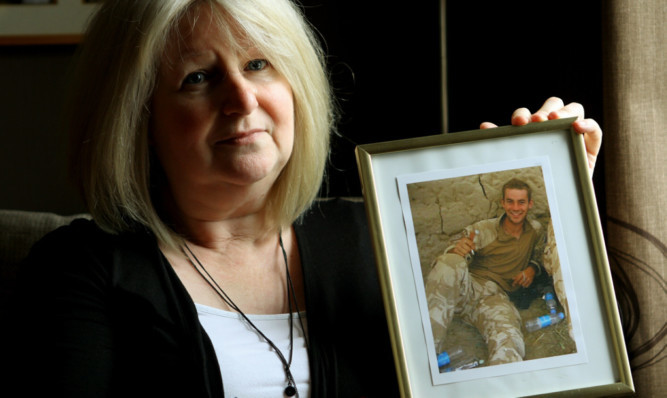The mother of a Perthshire Black Watch soldier who committed suicide after returning from combat in Afghanistan has said she would “hate to see another drop of British blood spilled” there.
British military personnel have been deployed to Afghanistan’s Helmand province as reports suggest the Taliban is close to overrunning Sangin town.
A small number of personnel had been sent to Camp Shorabak – near the former Camp Bastion – in an “advisory role”, the Ministry of Defence said.
June Black, 58, of Rattray, whose 22-year-old son Aaron, committed suicide just before Christmas 2011 whilst suffering Post Traumatic Stress Disorder, said: “I feel for the families of soldiers who were killed in action in Afghanistan, some of whom I speak to on Facebook. This will be bringing so much pain back for them.”
The Ministry of Defence says the British military will not be in combat and are part of a larger Nato team.
But June said it could open old wounds for many of the families of the 453 British soldiers killed in Afghanistan between 2001 and 2014.
UK combat operations in Afghanistan ended last year, but about 450 international troops remain in mentoring and support roles.
Helmand’s governor, Mirza Khan Rahimi, insisted the authorities were still in control of Sangin, in the province, but his own deputy said the town had been overrun by Taliban militants.
The police headquarters reportedly remains under siege after a Taliban attack.
June, whose story was told in Matthew Green’s recent book about Post Traumatic Stress Disorder called Aftershock, said Christmas was a particularly difficult time for her and would be for other families.
She could not speak on behalf of other families and appreciated that Aaron’s circumstances were different as he was not killed in action. But she added: ”It’s not as simple as saying the boys out there died in vain, because it could equally be argued that what they were doing at the time was worthwhile. I’m afraid I don’t know enough about the politics.
“I would love to ask Aaron what he thinks about it all. What I can say is that I still haven’t had an apology from the Ministry of Defence for the acknowledged “systemic failure” that resulted in my son not being followed up as he had requested. Who knows, maybe he would still have been alive today if he had been”
Nick-named ‘Blackie’ by his Royal Regiment of Scotland battalion colleagues, Aaron Black’s unit Two Platoon, Alpha Company was posted to Afghanistan in March 2009. Amongst them was close friend James Forrester of Methil, who had been in the battalion a couple of years longer.
After intense training, they quickly found themselves in the thick of combat against the Taliban in the baking heat of Helmand. It was a world of rocket propelled grenades (RPG), improvised explosive devices (IED) and being pinned down for hours under heavy fire, where every moment could be your last. They experienced the stresses of colleagues blown apart or badly injured in heavy fire fights. They were standing next to a friend Robert McLaren, from Mull, just minutes before he was obliterated by a Taliban mine. No significant body parts were ever found.
Aaron was watching from a rooftop when Sergeant Stuart Millar, of Inverness, and Private Kevin Elliott, of Dundee, were wiped out by a RPG and as colleagues struggled over rough ground to recover their remains on stretchers. James was given the grim task of packing away their blood-stained gear.
A total of 100 British troops were killed in 2009 and many more wounded. It became known as the British army’s bloodiest summer of the war.
Aaron was particularly badly affected by the experiences. Back in the UK, he became increasingly dependent on alcohol. He decided to leave the army and returned to Blairgowrie in May 2011. He had dreams of following the path of other ex-forces who had landed lucrative expatriate jobs protecting ships from pirates off the coast of Africa. But he struggled to adjust to civilian life.
Shortly before Christmas that year, and haunted by memories of Afghanistan and the deaths of friends, including Cupar soldier Darren Lackie (who died of mysterious head injuries whilst on holiday in Portugal in April 2011) and Methil soldier Mark Connolly (who died after being punched by a fellow squaddie at a pub in Germany), Aaron surrounded himself with treasured photographs, his army medals and a crucifix and sent a last ‘Goodbye’ text message to his mum June before taking his own life.
